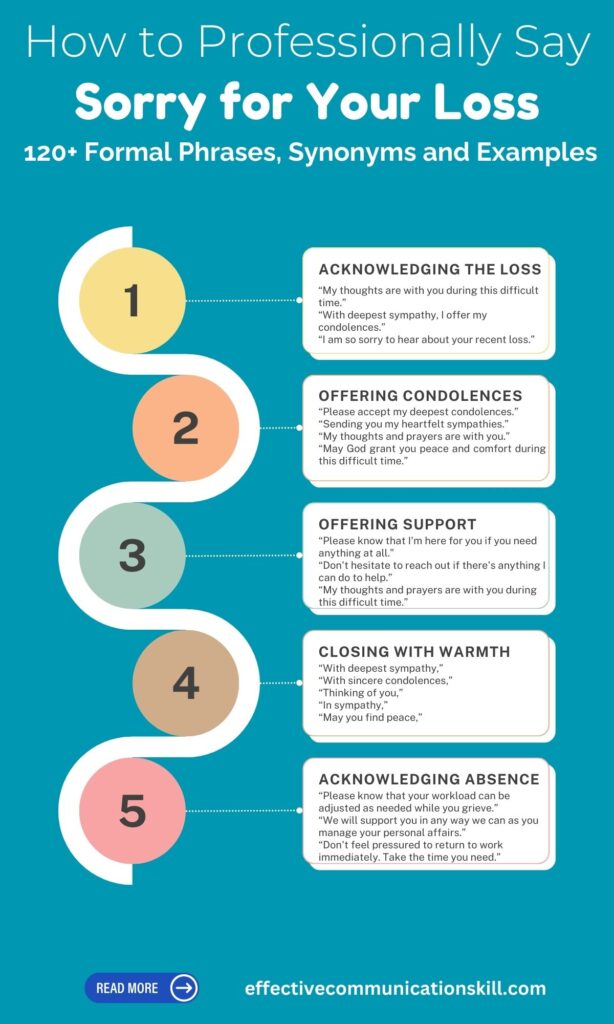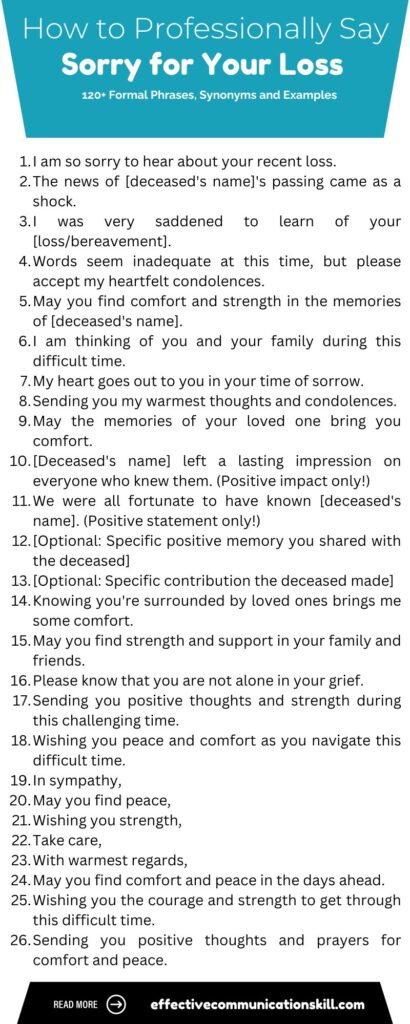How to Say Sorry for Your Loss Professionally
Words hold immense power, especially during times of loss. A well-crafted message of condolence can offer solace and support to a grieving colleague, client, or business partner.
Studies by psychologists have shown that social support networks are crucial for healthy grieving. A 2021 study published in the Journal of Personality and Social Psychology found that individuals with strong social connections reported lower levels of depression and anxiety following a loss.
How to Professionally Say You Are Wrong – This begs the question: How to professionally say sorry for your loss in a way that acknowledges the pain while respecting workplace boundaries? Fear not! This guide will equip you with the tools and language to craft a heartfelt and appropriate message of condolence for a colleague or client experiencing loss.

How to Say Sorry for Your Loss Professionally
Here are five key elements to craft a professional yet heartfelt condolence message to say sorry for your loss politely:
1. Acknowledge the Loss: Begin by explicitly acknowledging the loss. This shows you’re aware of their situation and expresses your concern.
- Example: “I was saddened to hear about the passing of your [relationship to deceased].”
2. Offer Sincere Condolences: Phrases like “My deepest condolences” or “Please accept my heartfelt sympathies” convey your genuine sorrow for their loss.
- Example: “Please accept my deepest condolences on the loss of your mother.”
3. Briefly Share a Memory (Optional): If you have a positive memory of the deceased you can share it briefly. This personalizes your message and shows you valued them.
- Example: “I remember [deceased’s name] always had a kind word and a funny story to share. They will be dearly missed.” (Note: Only use positive memories and avoid dwelling on the loss itself)
4. Offer Support (Without Imposing): Let them know you’re there for them, but avoid being intrusive.
- Example: “Please know that I’m here for you if you need anything at all, whether it’s help with a project or just someone to talk to.”
5. Close with Warmth: End your message with a warm closing that reiterates your support.
- Example: “My thoughts are with you and your family during this difficult time.”
How to Say Sorry for Your Loss Professionally: 120+ Formal Phrases, Synonyms and Examples
Here’s a list of formal phrases, synonyms, and examples to say sorry for your loss professionally.
Acknowledging the Loss:
- I was saddened to hear about the passing of your [relationship to deceased].
- I was deeply sorry to learn of [deceased’s name]’s passing.
- Please accept my sincere condolences on your loss.
- My thoughts are with you during this difficult time.
- With deepest sympathy, I offer my condolences.
- I am so sorry to hear about your recent loss.
- The news of [deceased’s name]’s passing came as a shock.
- I was very saddened to learn of your [loss/bereavement].
- Words seem inadequate at this time, but please accept my heartfelt condolences.
- May you find comfort and strength in the memories of [deceased’s name].
Offering Sincere Condolences:
- Please accept my deepest condolences.
- Sending you my heartfelt sympathies.
- My thoughts and prayers are with you.
- May God grant you peace and comfort during this difficult time.
- Wishing you strength and solace in the days ahead.
- With deepest sympathy for your loss.
- I am thinking of you and your family during this difficult time.
- My heart goes out to you in your time of sorrow.
- Sending you my warmest thoughts and condolences.
- May the memories of your loved one bring you comfort.
Sharing a Memory:
- [Deceased’s name] was a wonderful person, and they will be dearly missed. (Positive memory only!)
- I remember [deceased’s name] always having a kind word and a funny story to share. (Positive memory only!)
- [Deceased’s name] had a positive impact on so many lives, including mine. (Positive impact only!)
- I will always cherish the memories I have of [deceased’s name]. (Positive memories only!)
- [Deceased’s name] will be remembered for their [positive quality]. (Positive quality only!)
- Their [positive quality] will be deeply missed. (Positive quality only!)
- [Deceased’s name] left a lasting impression on everyone who knew them. (Positive impact only!)
- We were all fortunate to have known [deceased’s name]. (Positive statement only!)
- [Optional: Specific positive memory you shared with the deceased]
- [Optional: Specific contribution the deceased made]
Offering Support (Without Imposing):
- Please know that I’m here for you if you need anything at all.
- Don’t hesitate to reach out if there’s anything I can do to help.
- My thoughts and prayers are with you during this difficult time.
- Please take care of yourself during this time.
- If there’s anything I can do to ease your burden, please don’t hesitate to ask.
- Knowing you’re surrounded by loved ones brings me some comfort.
- May you find strength and support in your family and friends.
- Please know that you are not alone in your grief.
- Sending you positive thoughts and strength during this challenging time.
- Wishing you peace and comfort as you navigate this difficult time.
Closing with Warmth:
- My thoughts are with you and your family during this difficult time.
- Sending you all my love and support.
- With deepest sympathy,
- With sincere condolences,
- Thinking of you,
- In sympathy,
- May you find peace,
- Wishing you strength,
- Take care,
- With warmest regards,
Expressing Specific Well Wishes:
- May you find comfort in the memories of your loved one.
- Wishing you peace and strength as you navigate through this loss.
- Sending you heartfelt wishes for comfort and healing during this difficult time.
- May your happy memories bring you solace in the days ahead.
- Wishing you peace and comfort as you grieve the loss of your loved one.
- Sending you strength and support during this challenging time.
- May you find comfort and peace in the days ahead.
- Wishing you the courage and strength to get through this difficult time.
- Sending you positive thoughts and prayers for comfort and peace.
- With deepest sympathy and heartfelt wishes for strength during this sorrowful time.
Formal Alternatives to “Sorry for Your Loss”:
- Please accept my sincerest condolences.
- With deepest sympathy for your loss.
- Thinking of you during this difficult time.
- Sending you my heartfelt sympathies.
- My thoughts and prayers are with you.
- Wishing you strength and comfort during this challenging time.
- May you find peace and solace in the days ahead.
- With heartfelt condolences on your recent loss.
- I was saddened to learn of your loss. Please accept my condolences.
- Words seem inadequate at this time, but please know that I am thinking of you.
Religious or Spiritual Condolences (Use with Caution):
- (For Christians): May God grant you peace and comfort during this difficult time.
- (For Muslims): Inna lillahi wa inna ilayhi raji’un (To God we belong and to Him we return). May Allah grant you comfort and patience.
- (For General): Sending you thoughts of peace and strength during this time of loss.
- (For General): May your faith be a source of comfort during this difficult time.
- (Important): Only use religious condolences if you know the recipient’s faith or beliefs. It’s always safer to use more general phrases.
Acknowledging Absence Due to Loss:
- I understand you may need to take some time away during this difficult time. Please don’t hesitate to do so.
- Please know that your workload can be adjusted as needed while you grieve.
- We will support you in any way we can as you manage your personal affairs.
- Don’t feel pressured to return to work immediately. Take the time you need.
- Please let me know if there’s anything I can do to help ensure a smooth handover of your responsibilities during this time.
Following Up After the Initial Message:
- A week or two after your initial message, a brief follow-up can show continued support.
- You can say: “I was thinking of you again today and wanted to check in. Please know I’m here for you if you need anything.”
- If they haven’t returned to work yet, you can say: “I hope you’re taking the time you need to grieve. Please let me know when you expect to be back in the office.”
- You can offer to help with specific work tasks: “Is there anything I can do to help catch you up on work when you return?”
- Keep your follow-up messages brief and respectful of their privacy.
Considering the Relationship):
- The closer your relationship with the colleague, the more personal you can tailor your message.
- For a close colleague, you can share a specific memory or anecdote that highlights the deceased’s positive qualities.
- If you don’t know the colleague well, a more general message of condolence is appropriate.
- Err on the side of caution and keep it professional if unsure of the closeness of the relationship.
- It’s always better to be sincere and respectful than overly familiar.

Writing a Message on Behalf of a Team:
- If composing a message on behalf of a team, gather well wishes from colleagues.
- You can say: “The entire team at [Team name] was saddened to hear about the passing of your [relationship to deceased].”
- Briefly mention a positive quality or contribution of the deceased that the team appreciated.
- Offer collective support: “We are all here for you if you need anything at all.”
- One person can proofread and send the final message on behalf of the team.
Delivering the Message:
- In Person: If appropriate, a heartfelt in-person message can be very impactful.
- Email: A sincere email is a good option for most situations.
- Handwritten Note: For a close colleague or if a personal touch is desired, a handwritten note can be a thoughtful gesture.
- Phone Call: A phone call can be appropriate for a close colleague or friend, but ensure it’s a convenient time for them.
- Flowers or Donation (Optional): Sending flowers or making a donation to a charity in the deceased’s name can be a kind gesture, but only do so if you know it would be appreciated.
Examples Using Formal Condolence Phrases
Here are some examples showcasing how to utilize the previously mentioned formal condolence phrases in various situations. You can uphold professionalism and promote cooperation by finding other ways to say sorry for your loss politely..
- Acknowledging the Loss and Offering Condolences:
- Scenario: You learn via email that a colleague’s spouse has passed away.
- Formal Message: “Dear [Colleague’s name], I was deeply saddened to learn about the passing of your spouse. Please accept my sincerest condolences during this difficult time. [Optional: Briefly share a positive memory of the spouse, if appropriate].”
- Sharing a Memory and Offering Support:
- Scenario: You worked closely with a colleague whose parent recently passed away.
- Formal Message: “Dear [Colleague’s name], I was so sorry to hear about the loss of your mother. She always seemed so supportive of your work, and I remember how much you enjoyed [positive memory about the parent]. Please know that I’m here for you if you need anything at all, whether it’s help with a project or just someone to talk to.”
- Expressing Specific Well Wishes:
- Scenario: A team member’s child has passed away.
- Formal Message: “Dear [Team member’s name], Words cannot express how deeply sorry I am for the loss of your child. May you find comfort in the memories you shared and strength in the love of your family and friends during this incredibly difficult time.”
- Following Up After the Initial Message:
- Scenario: A week has passed since a colleague lost their father.
- Formal Message: “[Colleague’s name], I was thinking of you again today and wanted to check in. I know this is a very difficult time, and I wanted you to know I’m here for you if you need anything at all.”
- Writing a Message on Behalf of a Team:
- Scenario: A team member’s long-term partner has passed away.
- Formal Message: “Dear [Team member’s name], The entire team at [Team name] was saddened to hear about the passing of your partner. [Partner’s name] always seemed so kind and supportive whenever they visited the office. We will all miss their presence. We are all here for you if you need anything at all during this difficult time.”
- Delivering the Message in Person:
- Scenario: You bump into a colleague in the office hallway who just lost their sibling.
- Formal Response: “[Colleague’s name], I’m so sorry to hear about your loss. Your sibling was always such a [positive quality] person. Please accept my deepest condolences.” (Note: Since this is an in-person interaction, gauge the colleague’s emotional state and keep it brief. You can offer to follow up with a more detailed message later.)
- Acknowledging Absence Due to Loss:
- Scenario: You manage a team member whose grandparent passed away, and they haven’t returned to work yet.
- Formal Message: “[Team member’s name], I understand this is a difficult time for you. Please take all the time you need to grieve. Your workload can be adjusted as needed upon your return. Don’t hesitate to reach out if there’s anything I can do to help during this time.”
- Considering the Relationship:
- Scenario: A coworker you don’t know well lost their pet.
- Formal Message: “Dear [Coworker’s name], I was sorry to hear about the loss of your pet. Please accept my condolences during this difficult time.” (Note: Since you don’t know them well, a general message is appropriate.)
- Religious or Spiritual Condolences (Use with Caution):
- Scenario: You know your colleague is Muslim and their close friend passed away.
- Formal Message: “[Colleague’s name], I was saddened to learn about the passing of your friend. Inna lillahi wa inna ilayhi raji’un (To God we belong and to Him we return). May Allah grant you comfort and patience during this difficult time.” (Note: Only use this if you are certain of their faith.)
- Offering Support Without Imposing:
- Scenario: You learn a client’s business partner passed away unexpectedly.
- Formal Message: “Dear [Client name], I was deeply sorry to hear about the passing of your business partner. They were a valuable asset to your company, and their presence will be missed. Please know that we are here to support you and your team in any way we can during this challenging time.”
- Expressing Sympathy for a Colleague Who Lost a Former Colleague:
- Scenario: A former colleague you still keep in touch with just lost a coworker they were close to.
- Formal Message: “Dear [Former colleague’s name], I was saddened to hear about the passing of your former colleague, [Deceased’s name]. They always seemed like a wonderful person from our conversations. Please accept my condolences and know that I’m thinking of you during this difficult time.”
- Responding to a Public Announcement of Loss:
- Scenario: You see a social media post from a colleague announcing the passing of their parent.
- Formal Message: (In the comments section): “[Colleague’s name], I was so sorry to hear about the loss of your parent. Sending you and your family my heartfelt condolences.” (Note: Keep social media messages brief and respectful.)
- Addressing a Loss Through Retirement:
- Scenario: A colleague is retiring due to the loss of their spouse.
- Formal Message: “Dear [Colleague’s name], Congratulations on your retirement! While I’m happy for this next chapter, I also wanted to express my sincere condolences on the passing of your spouse. They were always so supportive of your career. Wishing you peace and strength as you navigate this transition.”
- Acknowledging a Loss During Performance Review:
- Scenario: A team member has recently lost a parent, and it has impacted their work performance.
- Formal Approach: During the review, acknowledge the difficulty: “I understand this past year has been challenging for you with the loss of your parent. Your well-being is a priority. Let’s discuss ways to adjust your workload or set more manageable deadlines to accommodate this difficult time.”
- Offering Help with Specific Tasks:
- Scenario: A colleague lost a close friend and is overwhelmed with their workload.
- Formal Message: “[Colleague’s name], I was so sorry to hear about your friend. Please know I’m here to help in any way I can. Is there a specific project or task I can take off your plate to ease your burden during this time?”
- Writing a Condolence Message for a Sudden Loss:
- Scenario: A colleague’s child tragically passed away in an accident.
- Formal Message: “[Colleague’s name], Words cannot express the shock and sadness I felt upon hearing about the loss of your child. This is an unimaginable tragedy. Please accept my deepest condolences during this incredibly difficult time. May you find strength and support in your loved ones.”
- Acknowledging a Loss Due to Illness:
- Scenario: A client’s business partner has passed away after a long battle with illness.
- Formal Message: “Dear [Client name], I was saddened to learn about the passing of your business partner. We know they fought their illness bravely. Please accept my condolences and know that our thoughts are with you and your team during this difficult time.”
- Offering Support After a Traumatic Loss:
- Scenario: A coworker lost their spouse in a fire.
- Formal Message: “[Coworker’s name], I was so sorry to hear about the devastating loss of your spouse. This must be an incredibly difficult time for you. Please know that I’m here for you if you need anything at all, even if it’s just someone to listen.”
- Acknowledging a Loss During a Merger or Acquisition:
- Scenario: A colleague from a company being acquired recently lost their parent.
- Formal Message: “[Colleague’s name], During this time of transition with the merger, I also wanted to express my condolences on the passing of your parent. Please know that we understand this is a difficult time for you, and we are here to support you in any way we can as we move forward.”
- Offering Help with Bereavement Resources:
- Scenario: A team member lost their significant other and seems overwhelmed with grief.
- Formal Message: “[Team member’s name], I was deeply sorry to hear about the loss of your partner. Please know that I’m here for you if you need anything at all. There are also many resources available to help with grief, such as [Insert Local Bereavement Resources]. Don’t hesitate to reach out if you’d like help finding information or support groups.”
- Acknowledging a Loss During the Holidays:
- Scenario: A client mentions their business partner passed away right before the holidays.
- Formal Message: “Dear [Client name], Thank you for sharing the news about your business partner. The holidays can be a difficult time for grieving, and our thoughts are with you and your team during this season. Please know we are here to support you in any way we can.”
- Offering Condolences After a Long Absence:
- Scenario: You learn a former colleague lost a parent months ago.
- Formal Message: “Dear [Former colleague’s name], I recently heard about the passing of your parent. Please accept my sincere condolences, even though it’s been some time since we last connected. Your parent always seemed like a wonderful person from our conversations. Thinking of you during this difficult time.”
- Responding to a Colleague Who Lost a Pet:
- Scenario: A colleague who shares a love for animals lost their dog.
- Formal Message: “[Colleague’s name], I was so sorry to hear about the loss of your dog. Pets become such important members of the family, and their absence is deeply felt. Please accept my condolences during this difficult time.”
- Acknowledging a Loss in a Formal Speech or Presentation:
- Scenario: You’re giving a presentation at a conference and learn a colleague recently lost a child.
- Formal Approach: “Before we begin, I wanted to take a moment to acknowledge the recent passing of [Deceased’s name], a dear colleague and friend to many of us here today. [Deceased’s name] was a [positive quality] person who will be deeply missed. Our thoughts are with their family and loved ones during this difficult time.” (Note: Keep it brief and respectful within the context of your presentation.)
- Offering Condolences After a Colleague Leaves the Company:
- Scenario: A colleague who recently left the company for a new opportunity loses their spouse.
- Formal Message: “Dear [Former colleague’s name], I was so sorry to hear about the passing of your spouse. While we haven’t been colleagues recently, I wanted to reach out and offer my condolences. Please know that you and your family are in my thoughts during this difficult time.”

Conclusion
Navigating the complexities of offering condolences in a professional setting can feel daunting. However, by following these tips and utilizing the formal phrases and synonyms provided, you can craft a message that expresses sincere sympathy while maintaining workplace boundaries.
Remember, even a simple “how to say sorry for your loss professionally” delivered with genuine care can offer significant comfort during a difficult time. Let empathy be your guide, and your message will surely resonate.
